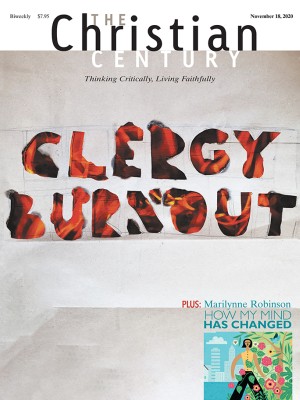
“I am feeling bullied by some of the people in my church,” a clergy friend told me recently. “They criticize everything I do, so I do more and more just to please them. Nothing I do works; nothing makes them happy.”
When the pandemic hit in March, congregational leaders pressed him to develop online worship, dramatically increasing his workload overnight. More recently, he’s been feeling pressure around the timeline for the church to go back to in-person worship. Demands for pastoral care have increased, too. But he’s just as anxious as his parishioners are about the virus, not to mention the natural disasters, racial injustice, and political turmoil. “Where am I supposed to find my support?” he asked me. He’s begun to self-soothe his anxiety with a variety of unhealthy behaviors, even crossing the line into potential ethical violations.
My friend is showing signs of clergy burnout—and he hasn’t told his church lay leaders how he’s feeling. “I can’t talk to them,” he explained to me. “They don’t understand that I have lost confidence and energy; they just think I am having a few bad days.” He also expressed reluctance to reach out to a counselor or someone from the wider church. He feels paralyzed, afraid of being judged and removed from his ministry position.
Read our latest issue or browse back issues.
I heard this sort of concern often in my former work as an attorney and a court judge; now I’m a pastor who consults with other pastors and churches. I frequently see clergy who feel they lack compassionate, supportive resources to turn to even as they approach the breaking point, putting pressure on themselves to always do more and do it well. I observe the way unhealthy relationships and broken trust form the core of boundary violations. And I see the dynamic of worried observers wringing their hands, unsure how to effectively intervene.
Often the congregation is simply unaware of the danger signs. They may notice their pastor growing more irritable and looking more tired on their Zoom meetings. Less obvious signs of distress might include increased time on the internet; disarray in communications and record keeping; increased use of alcohol, caffeine, or other substances; withdrawal from social interaction; and excessive vacation or sick days. Pastors often take everything on their own shoulders, suffer burnout, and then retreat into themselves, feeling inadequate and hopeless.
When they do reach out for help, they sometimes do so in unhealthy ways. Often pastors lack necessary professional supervision—spiritual direction, counseling, collegial support—and look instead to church staff and members to meet their personal needs. Sentiments like “I just need someone to talk to” or “you’re the only person who understands me” are often alarms that intervention is necessary to keep a pastor’s ministry relationships from taking a damaging turn.
When clergy reach extremes of emotional and spiritual exhaustion, they aren’t the only ones who suffer. Congregants will be at risk, and some of them will never trust the church or pastors again. But responsibility for church health shouldn’t rest solely on the pastor. Church communities too need education and tools in order to respond to clergy burnout in balanced, faithful, and compassionate ways.
Most of the literature about pastor-parish relationships has been directed to clergy. What about the other side of the relationship?
Imagine a pastor who feels pressured to spend time with a parishioner who comes to his office almost daily to talk about an unsatisfying marriage. The pastor knows the parishioner is vulnerable, the marriage is in trouble. He also recognizes that he is vulnerable. He has been feeling worn out and unappreciated, and he has begun to like the parishioner’s excessive attention.
In the best-case scenario, the pastor has been trained to recognize the ethical concerns the relationship poses and will bring the issue to church lay leaders—and they have been trained as well, to recognize the red flags of clergy burnout. They hear the pastor’s frustrations with empathy, establish boundaries for both parties, and refer both pastor and parishioner for professional counseling.
It’s a pastor’s responsibility to maintain good boundaries, and boundaries training for ministers, which many denominations require, is indispensable. But notice how such a requirement implicitly places the burden for the health of the congregation entirely on the pastor. What is missing are training and resources for the rest of the church, including the staff and lay leaders who work directly with the pastor.
Church leaders often talk about the ministry of the laity but rarely give them the support and resources needed to effectively serve in the unique ways in which laypeople are called. Traditional boundaries training that addresses only clergy wastes this opportunity to educate and involve laypeople for the benefit of all.
As clergy learn how to maintain their spiritual and emotional health in crisis times, congregations can be trained to recognize the signs of pastoral instability and to reach out for appropriate and effective supervision should the red flags of clergy burnout appear. An aware congregation can be the very tool struggling clergy need in times of burnout.
This awareness is about more than just boundaries in a pastor’s relationships with staff and congregation. Clergy self-care is crucial to emotional and spiritual health, too—and with new demands on pastors to do ministry online and to provide pastoral care in a time of crisis, it’s become even more critical. As with pastoral boundaries, clergy have the primary responsibility for their own self-care—it’s not something that can simply be delegated. But it’s also important for there to be a wider awareness of the need.
Think of the stressed-out pastor who has plans to prioritize her well-being by exercising three times a week and taking Mondays off, but some urgent task always gets in her way. When she begins to be noticeably worn down, her lay leaders might hold her accountable to her exercise and rest plans. They might recruit people within the church to take over some of her administrative tasks. They might communicate the pastor’s day off to the congregation and remind people how important it is to her well-being.
But church members don’t need to know everything about their pastor’s personal struggles to help maintain the health of the community. In fact, knowing too much about their pastor’s personal life can also be an unhealthy burden.
One church leadership team, well trained in the principles of healthy communication and disclosure, acted responsibly when their minister confessed she’d been arrested for shoplifting. The team worked together to reach an agreement with the pastor and then carefully lay out the information that was essential for congregants to know. This appropriate disclosure of information affecting church health and stability calmed anxieties, reduced gossip and rumors, and demonstrated that church leaders were managing the situation in a way that protected both church and pastor. The plan provided for the pastor to get help with her burnout. Once she had regained emotional and spiritual stability, there was a pathway for her to return to ministry duties with safeguards in place to guard against further unhealthy behaviors.
This church’s healthy approach to a stressful situation reduced the risk of destructive fallout from a pastor’s unhealthy coping strategies. With careful and measured planning and response, everyone knew their roles going forward. Church leaders provided a non-anxious presence for the congregation, and no one had to bear the uncomfortable and unhealthy burden of being a secret keeper or a whistle-blower.
I consult and provide resources on clergy burnout, but I am as vulnerable to it as anyone else. That’s why I gave the congregation I serve an outline that clearly spells out how I will partner with them to nurture and sustain healthy relationships.
Our church’s pastoral care team has been trained in the principles and practices of healthy boundaries, the limits of their spiritual care, and the healthy disclosure of information they receive in the course of their caregiving. Periodically I open my pastoral care log to my pastor-parish relations team to review together—the names are number-coded to protect confidentiality—so we can monitor the frequency and duration of my contact with congregants in need of pastoral care. I meet with this team regularly to talk openly and honestly about how I am doing in my ministry and in my life outside of ministry.
These are not counseling sessions. They are intentional checking-in conversations that help trusted laypeople, in a limited-information setting, to monitor my emotional and spiritual health. I also meet with a spiritual director every eight weeks and as needed; the church pays her session fees as part of my wellness benefits package. And I have a clergy cluster that stays in steady contact, a group of trusted colleagues who speak the truth in a way that we can all hear it. These are indispensable resources for church ministry relational health.
There are still times I need to be reminded to protect my energies so that my pastor-parishioner relationships stay healthy. Recently, after reading my year-end report, our church’s leadership team expressed concern that I might be over-functioning in church administrative life. At first, I was defensive. I am a natural achiever and leader, and I can do it all! But the more I replayed our discussion in my head, the more grateful I was for the training regularly provided to our lay leaders. They recognized in me a red flag of early clergy burnout and were expressing concern for my emotional and spiritual health. Because of their concern, I identified some program areas that I could delegate to lay leaders. Not only did I find that some ministries are better led by congregants, I immediately felt lighter and more equipped for the tasks that truly call for my gifts.
Letting go of some of this control was good for my own well-being; it was also empowering for my church members. Such steps can make our churches healthier, more collaborative, and more balanced. A priesthood of all believers is also a priesthood of partners in service to God. If churches are to be the transforming presence of God in the world—modeling for all people compassion, hope, and positive social change—then pastors need training in healthy ministry relationships, and so do their congregants.





